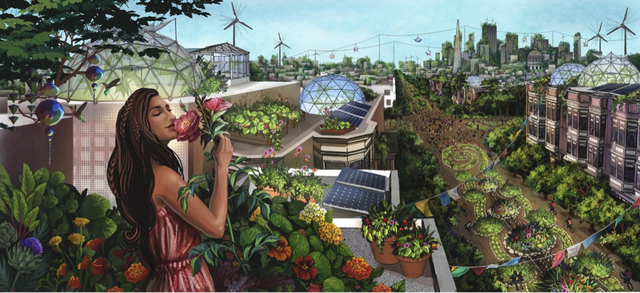
In regards to the disruption of our eco and social systems, there is an emerging need to take action. We can see this when reflecting on this current pandemic; we are ALL going through. Previously, we could still base our belief that we were disconnected to the flooding of Katrina Hurricane, the Rain Forest wildfire in Amazon, or the endangered polar bear population resulting from the melting ice cap of the Antarctic due to climate change. But we are a collective being, living on the same planet while creating ripple effects with our actions. Covid-19 by its international consequences, had, and still proves to all of us that yes we are connected. We are breathing the same air, we are eating the same food and have similar needs. It is urgent to consider creating or joining an entity that promotes eco-livelihood, eco-entrepreneurs and/or regenerative businesses to make sure that we will be part of a sustainable future. When we change our ways of sourcing income we can transform how we interact with the planet.
Now let go deeper into the tangible shift we could engage ourselves in, by broadening our awareness and knowledge of what those terms mean. The term Eco-Entrepreneur or Ecopreneur comes from an ecological Entrepreneur. Entrepreneurs’ meaning per Merriam Webster: One who organizes, manages and assumes the risks of a business or enterprise.
This concept is able to serve an individual but we need to adapt it into something that will take into account a broader collective. Reading the book of Robert Hall (currently President of GEN Europe) ”The Enterprising Ecovillager” (free download here), I found that “an ecopreneur” can be anyone who wants to successfully earn a living while striving to solve environmental problems.
A foundation of eco-livelihood could be based on “permaculture” which is a regenerative ideology that is taking into account nature and its habitat by creating resilient design systems. A couple in Vermont, Ben Falk, & Erica Koch Falk have a self sustaining homestead and businesses based on this ideology, Whole Systems Design.
Contrast to a homestead business, we can look at urban concepts in the book, written by Toby Hemenway, The Permaculture City. Hemenway is giving his readers collaborative ways to achieve the implementation of eco-livelihood in this landscape by breaking down permaculture principles to encourage urbanites by implementing resilient solutions.
When we look at new forms of “eco-entrepreneurship” we can see it as a more holistic approach rather than past concepts of compartmentalization and competition. Using principles (like those in permaculture) while planning your business or ecopreneur journey, can lead the way to a more resilient and regenerative model as explained below.
In her book, Regenerative Business, Carole Sanford brought the Regenerative business concept, as a functioning entity where no negative impact is made on the local or global environment, the community, or the economy. It will also engage in forward-thinking policies for environmental concerns and policies affecting human rights. *https://carolsanford.com/the-regenerative-business/
I suggest applying the “Three R” framework.
- Regenerative*
- Using an appropriate design and planning strategy
- Reconciliation
- Including the process healing and reconnection between the nature and Us
- Restorative
- Thinking and applying long term technic that will serve us and the nature
*Regenerative : “The term describes processes that restore, renew or revitalize their own sources of energy and materials, creating sustainable systems that integrate the needs of society with the integrity of nature.”(Regenerative Magazine)
Reading this text we can see models that we can refer to and we can also join these eco-businesses! I think it is important to include the latter option because not everyone wants to build their own entrepreneurial business but would feel happy working with someone else.
If you find that eco-livelihood is part of your journey consider buying our recording or short free downloadable eco-tool kit!
About the Author:
Leonie Brien – President of Whole Systems Network
Growing up in Cite Ecologique, a 35 year old ecovillage, she has learned and supported many successful ecologic, economic, social, and educational models that have made her community thrive. Her ecovillage has created [and currently supports] many eco-businesses and home to 130 people of all ages (100 people in Quebec and 30 people in New Hampshire).
